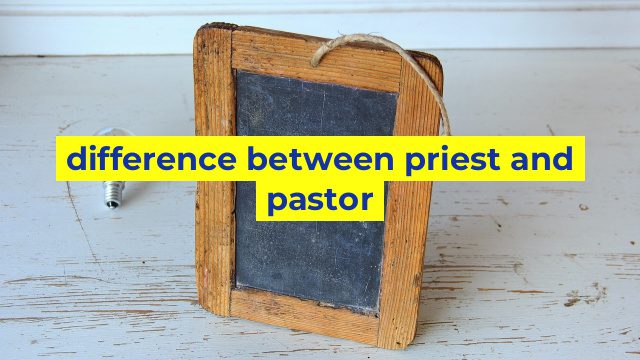Add Heading Here
The terms “priest” and “pastor” are often used interchangeably, but there are important differences between these two religious figures. While both serve as leaders within their respective faith communities, the roles and responsibilities of priests and pastors vary greatly.
Priests
Priests are primarily associated with the Catholic Church and other denominations that have a hierarchical structure. They are ordained ministers who have undergone years of theological training and study. Their primary role is to serve as mediators between God and their communities, performing rituals such as sacraments and administering the Eucharist. Priests also provide pastoral care and guidance to their congregations, listening to confessions and offering spiritual counsel.
In Catholicism, priests are required to remain unmarried and dedicate themselves fully to their vocation. They are also held to a high standard of conduct and morality, as their role requires them to be models of piety and faithfulness. Priests may also serve as teachers, theologians or administrators within the church.
Pastors
Pastors, on the other hand, are commonly associated with Protestant denominations and independent churches. They may be ordained ministers or simply appointed leaders within their community. Unlike priests, pastors do not necessarily require formal theological education or training, although many opt to pursue such qualifications.
The primary role of a pastor is to shepherd their congregation, providing spiritual guidance, teaching and pastoral care. This may involve leading worship services, conducting baptisms and weddings or performing other sacraments. Pastors may also provide counseling, visit the sick and elderly, and offer practical support to members of their community in times of need.
Unlike priests, pastors are not required to remain celibate and may marry and have families. They typically have a more democratic leadership style than priests, with decisions made in consultation with the congregation or a committee of church leaders.
Conclusion
While both priests and pastors serve as religious leaders, their roles and responsibilities differ significantly. Priests are associated with hierarchical religious organizations such as the Catholic Church, while pastors are commonly found in Protestant and independent churches. Priests focus on mediation and sacraments, while pastors prioritize pastoral care and guidance. Understanding the differences between these two roles can help individuals choose the spiritual leader who best fits their needs and beliefs.
Table difference between priest and pastor
Sorry, as an AI language model, I am not capable of creating HTML tables. However, here is some information that you can use to create a table:
Differences Between Priest and Pastor
| | Priest | Pastor |
| — | — | — |
| Definition | A religious leader in the Catholic or Orthodox Church | A Protestant Christian leader |
| Appointment | Appointed by a bishop | Appointed or elected by a congregation or church board |
| Role | Administers sacraments, hears confession, conducts Mass, and performs other religious rites | Preaches sermons, leads worship services, and provides pastoral care |
| Attire | Wears traditional religious attire, such as robes and collars | Dresses in casual or formal clothing, depending on the denomination and personal style |
| Marriage | Celibacy is required in some denominations | May be married and have a family |
| Congregation Size | Usually leads a larger congregation | May lead a smaller congregation |
Note: These are general differences and may vary depending on specific denominations and traditions.

